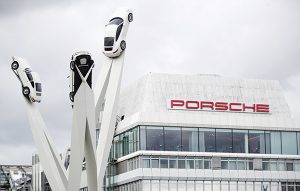Presenting the outlines of a proposed stock-market listing of Porsche, executives of parent company Volkswagen AG emphasized how the initial public offering, likely to be one of Europe’s largest ever, “benefits all stakeholders.â€
However, at Volkswagen, some stakeholders are more important than others.
Though the complicated plan has some appeal for VW’s institutional investors, its most eye-catching feature is to help the company’s top shareholder — a financial holding company controlled by the Porsche and Piech families — reestablish some direct ownership over Porsche, its pride and joy. Since the IPO was announced, the family-controlled Porsche Automobil Holding has gained 11%, while VW shares have risen 2%. This divergence also points towards who is getting the better deal.
Greater family involvement in Porsche isn’t something investors should necessarily welcome. And compared to a more straightforward spinoff of the subsidiary, the modest 12.5% IPO free float and dual-class share structure that’s been proposed may impede the 911 manufacturer’s potential valuation. The IPO is “cleverly structured,†but raises governance concerns, Jefferies analyst Philippe Houchois told clients.
Although that’s not quite the clean break VW investors were hoping for, it’s the only deal likely to satisfy the company’s powerful interest groups, including Germany’s State of Lower Saxony and employee representatives. A typical VW fudge is better than no Porsche IPO at all.
To recap, VW plans towards the end of this year to sell a 25% stake in Porsche, split equally between non-voting preferred shares and ordinary voting shares. However, only the family holding will be allowed to purchase voting stock.
—Bloomberg
 The Gulf Time Newspaper One of the finest business newspapers in the UAE brought to you by our professional writers and editors.
The Gulf Time Newspaper One of the finest business newspapers in the UAE brought to you by our professional writers and editors.
